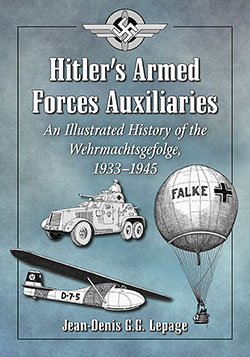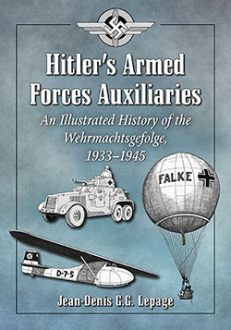Hitler’s Armed Forces Auxiliaries
An Illustrated History of the Wehrmachtsgefolge, 1933–1945
$39.95
In stock
About the Book
The story of Hitler’s Wehrmachtsgefolge (armed forces auxiliaries) is less well known than that of Germany’s other armed forces in World War II, such as the panzer divisions, the Luftwaffe and the Kriegsmarine. The Organization Todt (construction company), Reichsarbeitsdienst (labor service), Nationalsozialistische Kraftfahrer Korps (driver’s corp) and Volkssturm (people’s militia) were given the status of armed forces auxiliaries to protect their members under the Geneva Conventions should they be taken prisoner. By 1944, the Wehrmachtsgefolge comprised 40 percent of the German armed forces, and their contribution to the war effort was far from negligible. This illustrated history documents the development, structure and organization, uniforms, regalia and technical data of these units and discusses their role in the war and during the prewar period.
About the Author(s)
Bibliographic Details
Jean-Denis G.G. Lepage
Format: softcover (7 x 10)
Pages: 216
Bibliographic Info: 237 photos, chronology, bibliography, index
Copyright Date: 2015
pISBN: 978-0-7864-9745-4
eISBN: 978-1-4766-2088-6
Imprint: McFarland
Table of Contents
Table of Contents
Acknowledgments v
Introduction 1
Chapter 1: Organisation Todt 5
Fritz Todt 5
Autobahns (Motorways) 6
The West Wall 9
Fritz Todt’s Mysterious Death 13
Albert Speer and Xaver Dorsch 16
The OT During the War 20
Structure of the OT 21
OT-Militia (OT-SK) 25
Ranks of the OT 26
Uniforms and Insignia 27
Cadres and Slave Labor 33
Fortifications 38
U–Boat Pens 43
Protection of Industry 48
Revenge Weapons 49
Hitler’s HQ Bunkers 52
Public Shelters and Anti-aircraft Towers 54
Aftermath 57
Chapter 2: Deutsche Arbeitsfront (DAF) and Reicharbeitsdienst (RAD)—German Labor Front and National Work Service 59
Creation and Purposes of the DAF 59
Robert Ley 60
Organization of the DAF 62
DAF Werkscharen 67
Schönheit der Arbeit 68
Kraft durch Freude (KdF) 68
Reichsarbeitsdienst (RAD) 73
Women’s Labor Service 77
Structure of the RAD 78
Prewar Tasks of the RAD 81
The RAD at War 84
Pro-Nazi Foreign Labor Services 86
Militarization of the RAD 87
Ranks of the RAD 89
Uniforms of the RAD 91
Insignia, Flags and Dagger of the RAD 100
Chapter 3: Nationalsozialistisches Kraftfahrer Korps (NSKK) 104
Origins of the Motorized Corps 104
Structure of the NSKK 107
Prewar Tasks of the NSKK 108
Marine-NSKK 114
NSKK and Organisation Todt 114
The NSKK at War 115
Foreign Volunteers 117
Transportkorps Speer 120
Militarization of the NSKK 122
Ranks 123
Insignia 124
Uniforms 129
Aftermath 136
Chapter 4: Deutscher Volkssturm (German Popular Home Guard) 138
Situation in the Winter of 1944–45 138
Creation of the Volkssturm 138
Command 141
Organization 142
Uniforms 144
Ranks 149
Weapons 149
The Volkssturm at War 154
Aftermath 156
Chapter 5: Other Military Affiliated Units 158
Sturm Abteilung (SA) 159
Waffen SS 162
Hitler Youth (HJ) 168
Nazi Flyers Corps (NSFK) 170
National German Railway Company (DRG) 178
Ordnungspolizei (Orpo) 182
German Postal Service 185
Conclusion 189
Appendix: World War II Chronology 193
Bibliography 201
Index 203





